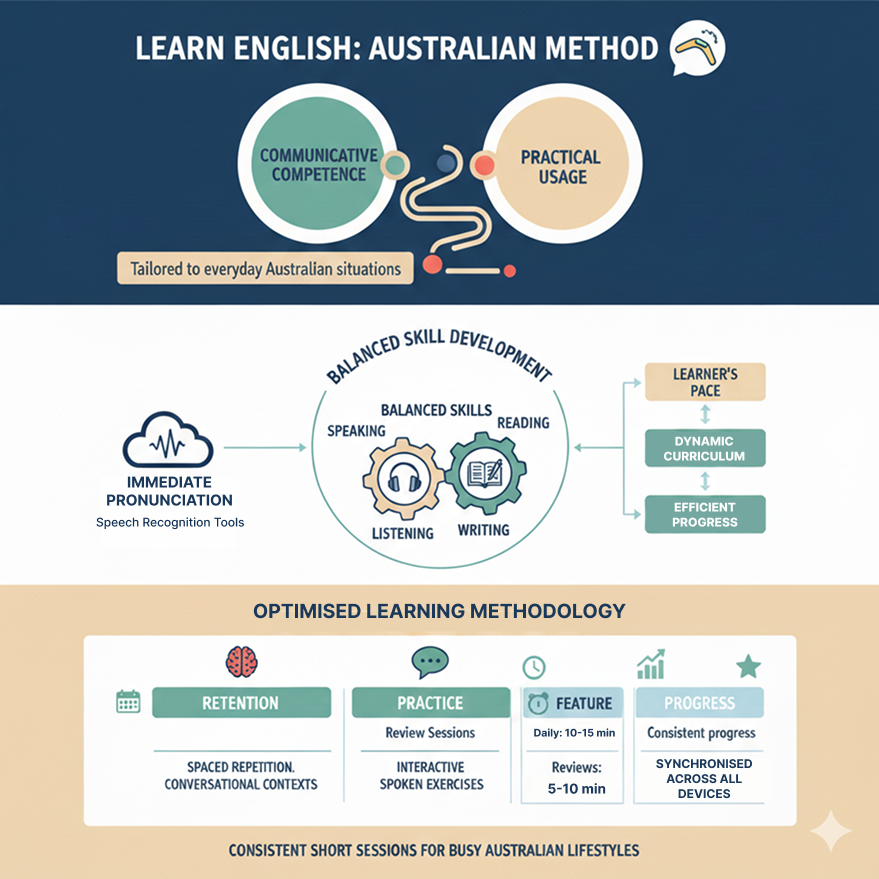Compare English Learning Solutions with Babbel in Australia
Compare language learning options in Australia. Babbel offers interactive lessons, speech recognition, and personalized learning paths for English mastery.
Understanding Babbel’s Learning Methodology in Australia
Our platform is designed to build communicative competence grounded in practical usage rather than abstract grammar rules. Australian learners benefit from lesson content tailored to everyday situations they encounter locally. Each session blends speaking, listening, reading, and writing tasks to foster balanced skill development. We utilise speech recognition tools to provide immediate feedback on pronunciation accuracy. The curriculum dynamically adapts to each learner’s pace and preferences, ensuring efficient progress.

To optimise retention, our lessons incorporate spaced repetition techniques. We prioritise conversational contexts to make grammar and vocabulary relevant and memorable. Learners can practise pronunciation through interactive spoken exercises. Progress is tracked automatically and synchronised across all devices for seamless learning continuity. Our methodology emphasises consistent short sessions to fit busy Australian lifestyles.
| Feature | Duration | Benefit |
|---|---|---|
| Daily Lessons | 10-15 minutes | Consistent progress |
| Review Sessions | 5-10 minutes | Memory reinforcement |
| Speaking Practice | 15-20 minutes | Pronunciation improvement |
Core Learning Features
Babbel provides interactive dialogues simulating real-life conversations. Lessons encourage active participation through immediate correction and suggestions. Vocabulary is introduced contextually and reinforced via repeated exposure. Speech recognition technology analyses spoken input for accuracy and fluency. Progress tracking and reminders help maintain study consistency.
Personalized Learning Paths
Our intelligent algorithm creates study plans tailored to initial assessments and user goals. Learners can select focus areas such as travel, business, or general English. Difficulty adjusts dynamically based on performance metrics. Targeted reviews enable mastery of challenging topics. Study schedules are personalised to optimise retention and time management.
Registration Process for Australian Students
Registering on our platform involves a simple, user-friendly process designed for quick onboarding. Visit Babbel’s website or download our mobile app from Australian app stores. Enter your email and create a secure password. Complete a placement test to identify your proficiency level. Select personal learning objectives from options such as travel, business, or everyday communication.
Subscription plans are designed to suit various budgets and commitment levels. Australian users can begin with a free trial to explore content before subscribing. Premium access unlocks all courses and features. Payment accepts Australian credit cards and PayPal. Local support is available during Australian business hours to assist with queries.
Account Setup Steps
Start by choosing your native language for clear instructions. Take the initial proficiency test to set your starting point. Configure daily reminders aligned with your schedule. Download lessons for offline use during commutes or travel. Sync progress automatically across devices.
Mobile Application Features for Australian Learners
Our mobile app offers full access to Babbel’s curriculum on smartphones and tablets. Australian students can download lessons for offline use during travel or limited internet access. Speech recognition enables pronunciation practice on the go. Push notifications remind users of daily goals and maintain streaks. Progress is automatically synchronised between app and desktop.
Offline Learning Capabilities
Lessons and vocabulary flashcards can be downloaded for offline review. Speaking exercises utilise the device microphone for real-time feedback. Completed lesson reviews and progress tracking remain accessible without internet. Synchronisation occurs automatically when connection is restored. This flexibility suits Australia’s mobile learners.
Interactive Exercise Types
The app contains multiple-choice grammar quizzes to reinforce concepts. Fill-in-the-blank tasks target vocabulary retention. Pronunciation assessments use speech recognition to evaluate accuracy. Listening sections feature native Australian English speakers. Writing exercises focus on constructing grammatically correct sentences.
The following exercise types enhance engagement and skill development:
- Multiple-choice grammar questions
- Vocabulary matching activities
- Pronunciation assessment drills
- Listening comprehension tasks
- Sentence construction exercises
Curriculum Structure and Learning Levels
Babbel’s curriculum aligns with CEFR standards, supporting progression from beginner (A1) to advanced (C1) levels. Content is structured into thematic modules reflecting practical communication needs. Australian cultural references are integrated to contextualise language usage. Grammar is explained within dialogues to aid natural acquisition. Vocabulary selection emphasises words and phrases relevant to daily Australian life.
Beginner Level Content (A1-A2)
At beginner levels, students acquire essential phrases for greetings, introductions, and personal details. Present tense verbs are introduced through practical dialogues. Numbers, dates, and times are practiced repeatedly. Simple conversation structures foster confidence in basic interactions. Lessons are designed to build a solid foundation.
Intermediate Progression (B1-B2)
Intermediate modules develop complex grammatical structures including past and future tenses. Conditional forms and subjunctive moods are introduced progressively. Learners practice expressing opinions and preferences clearly. Business communication modules prepare students for professional Australian environments. Emphasis remains on practical language application.
| Level | Focus Areas | Completion Time |
|---|---|---|
| A1-A2 | Basic communication | 3-6 months |
| B1-B2 | Complex structures | 6-12 months |
| C1 | Advanced fluency | 12-18 months |
Speech Recognition Technology and Pronunciation Training
Babbel employs advanced speech recognition to analyse pronunciation in real-time. Feedback includes identification of mispronounced phonemes and incorrect stress patterns. The system adapts to Australian English accent variations for accurate evaluation. Detailed phonetic guidance supports correction of challenging sounds. Regular speaking exercises build learner confidence for everyday communication.
Pronunciation Assessment Tools
Our tools pinpoint specific pronunciation difficulties for targeted practice. Students can listen to native speaker recordings multiple times. Visual indicators display stress patterns and intonation. Progress is tracked via recorded samples for self-comparison. Customised exercises address individual challenges systematically.
Pronunciation support includes:
- Real-time speech analysis feedback
- Native speaker audio models
- Visual stress pattern indicators
- Progress tracking recordings
- Personalised improvement recommendations
Review System and Memory Retention Strategies
We implement spaced repetition algorithms to maximise vocabulary retention. The review manager schedules reinforcement sessions at optimal intervals. Previously learned material is integrated with new lessons for balanced revision. Review frequency adapts to each student’s memory performance. This approach reduces forgetting and strengthens long-term recall.
Spaced Repetition Algorithm
Our system calculates ideal review timing per vocabulary item. Well-mastered words appear less often, while difficult terms receive more frequent practice. Learners can mark challenging words for additional focus. Retention rates are monitored to refine curriculum pacing. This personalised review enhances learning efficiency.
Review Exercise Formats
Review sessions use varied exercise types to maintain learner engagement. Flashcards support active recall of vocabulary. Listening exercises enhance comprehension skills. Fill-in-the-blank tasks reinforce grammar and vocabulary simultaneously. Exercise difficulty adjusts automatically based on recent performance.
| Review Type | Frequency | Purpose |
|---|---|---|
| Vocabulary Cards | Daily | Word retention |
| Grammar Drills | Weekly | Structure practice |
| Listening Tests | Bi-weekly | Comprehension skills |
Progress Tracking and Achievement Systems
Babbel’s dashboard provides detailed insights into learning progress across all language skills. Students can monitor daily streaks and lesson completion percentages. Vocabulary acquisition and grammar mastery statistics are clearly displayed. Achievement badges reward consistent effort and milestones. Progress reports help learners identify strengths and areas needing improvement.
Performance Analytics
The system records time spent on various exercise types. Learners can compare their progress with average completion rates. Patterns in learning behaviour inform personalised study recommendations. Graphs illustrate improvement trends over time. Detailed breakdowns highlight specific skill development.
Motivation and Gamification Elements
Daily streaks encourage regular practice habits. Achievement badges celebrate milestones such as lesson completion and pronunciation scores. Friendly leaderboards promote healthy competition among peers. Custom congratulatory messages recognise individual progress. Weekly challenges provide additional incentives to stay active.
Achievement categories include:
- Daily practice consistency streaks
- Lesson completion milestones
- Perfect pronunciation scores
- Vocabulary mastery levels
- Monthly study hour targets
Comparing Babbel with Other Learning Platforms in Australia
When Australian learners compare language platforms, Babbel’s structured methodology stands out. Our curriculum is grounded in pedagogical research rather than solely gamification. We emphasise practical communication skills needed for real-life situations. Each lesson integrates speaking, listening, reading, and writing components. Content is tailored to adult learners balancing study with work and life.
Content Quality and Pedagogical Approach
Babbel’s lessons are developed by experienced linguists and educators. Each module undergoes rigorous testing with real users before release. Curriculum progression aligns with second language acquisition science. Grammar is taught contextually within conversations. Vocabulary is chosen based on frequency and usefulness in Australian contexts.
Learning Efficiency and Time Investment
Lessons are designed for 10-15 minute sessions to fit busy schedules. The approach avoids unnecessary repetition or filler content. Clear objectives guide each module to maximise learning impact. Progress is measurable and transparent to learners. This efficient design supports sustainable language acquisition over time.
| Aspect | Babbel | Other Platforms |
|---|---|---|
| Curriculum Design | Research-based, contextual | Varied, often gamified |
| Skill Integration | All four skills per lesson | Often segmented |
| Lesson Duration | 10-15 minutes | Varies widely |
| Pronunciation Tools | Advanced speech recognition | Limited or none |
| Progress Tracking | Comprehensive, adaptive | Basic or absent |
Australian students benefit from Babbel’s commitment to effective, practical English learning. Our platform supports learners through every phase of their language journey.

